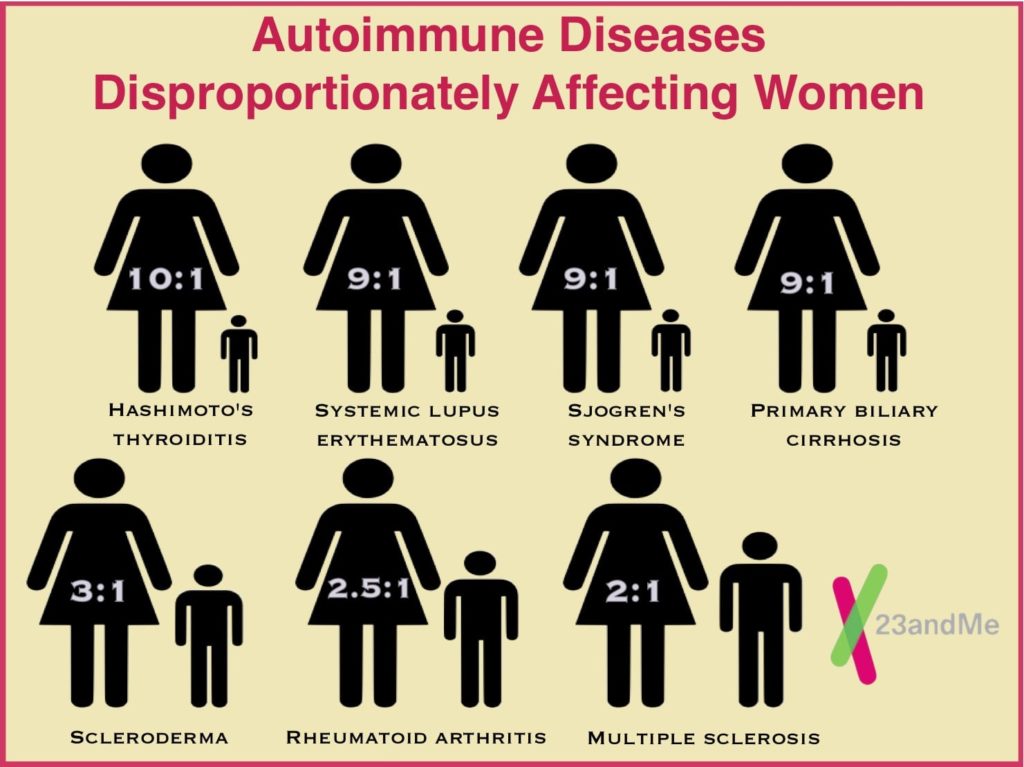 An autoimmune disease occurs when the immune system, which normally fights off viruses, bacteria, and infection mistakenly attacks your body. There are more than 100 autoimmune diseases. Autoimmune diseases are like a silent epidemic. About one in six people live and cope with autoimmune diseases according to the American Autoimmune Related Diseases Association. 75 percent of those people are women. The National Institute of Health has officially designated it a major women’s health issue. Autoimmune diseases include diseases of the nervous, gastrointestinal and endocrine systems, as well as the skin and joints and connective tissues, eyes, blood, and blood vessels. There are a lot of theories about why women have more autoimmune diseases. Hormones play a role and inflammation causes a role but there are no definitive answers. Men have hormones too, but women are still affected more. Estrogen predisposes women to autoimmune diseases.
An autoimmune disease occurs when the immune system, which normally fights off viruses, bacteria, and infection mistakenly attacks your body. There are more than 100 autoimmune diseases. Autoimmune diseases are like a silent epidemic. About one in six people live and cope with autoimmune diseases according to the American Autoimmune Related Diseases Association. 75 percent of those people are women. The National Institute of Health has officially designated it a major women’s health issue. Autoimmune diseases include diseases of the nervous, gastrointestinal and endocrine systems, as well as the skin and joints and connective tissues, eyes, blood, and blood vessels. There are a lot of theories about why women have more autoimmune diseases. Hormones play a role and inflammation causes a role but there are no definitive answers. Men have hormones too, but women are still affected more. Estrogen predisposes women to autoimmune diseases.
Pregnancy and Rheumatoid Arthritis
Rheumatoid arthritis (RA) is an autoimmune disease that is favorably influenced by pregnancy but relapses after delivery. A variety of circulating factors has been considered as candidates for inducing gestational improvement of RA; however, the factors/pathways responsible remain still elusive. The complex hormonal and immunological alterations of pregnancy may temporarily correct the disturbed immunoregulation of RA.
Autoimmune Diseases Are Typically Difficult to Diagnose
There’s usually no single test to diagnose autoimmune disease. You have to have certain symptoms combined with specific blood markers and in some cases, even a tissue biopsy. It’s not just one factor. Diagnosis can also be difficult because these symptoms can come from other common conditions. Symptoms cross many medical specialties and can affect all body organs, rashes, neurologic symptoms. the conditions are so complex there are a variety of specialists, making it difficult to understand the relationship among the various diseases or advances in treatment outside their own specialty. More information sharing is needed.
When Doctors Share Medical Records, It Can Aid in Diagnosis and Reduce Cost
Depending on the autoimmune disease you have, you may need to see a rheumatologist or an endocrinologist. What are the advantages of electronic health records? EHRs and the ability to exchange health information electronically between doctors can help them provide higher quality and safer care for patients. EHRs help providers better-managed care for patients. Doctors can share electronic medical records, so one provider can see what another provider thought and what labs were ordered, or treatments were received. This helps doctors come to a diagnosis and helps them reduce costs by not ordering duplicate labs
Triggers for Autoimmune Diseases
What we know in rheumatoid arthritis (RA) is that it is a genetic basis. Autoimmunity is known to have a genetic basis and tends to cluster in families as different autoimmune diseases. a mother may have lupus, her daughter, juvenile diabetes, her sister, graves disease, and her grandmother, rheumatoid arthritis. Also, people who smoke cigarettes or have periodontal disease are at higher risk for (RA)Two types of bacteria lead to (RA).
Ways to Prevent Autoimmune Diseases
To help prevent the development of autoimmune disease symptoms is by eating a healthy Mediterranean diet. It is plant-based and focuses on whole grains. Get regular exercise, reduce stress and get good sleep. Take omega 3 fatty acids, one gram per day, and be sure they are mercury-free.
Rheumatoid Arthritis is the Most Common Autoimmune Disease
1.5 million Americans have RA and it affects twice as many women as men. It affects the hands, feet, and every other joint except the spine. It causes synovitis, synovitis is medical-speak for inflammation in the synovium, the membrane that lines your joints. In healthy joints, this protective tissue is only a few cells thick. Its job is to produce fluid that lubricates and nourishes the joint. When the membrane is irritated or inflamed, it becomes thicker and swollen with excess synovial fluid. The inflamed synovium can eventually invade and destroy the cartilage and bone within the joint. RA can also affect the lungs, skin, or blood vessels. If RA inflammation goes unchecked, it can damage cartilage, as well as the bones. Joints can become loose, unstable, painful, and lose their mobility or become deformed. Joint damage cannot be reversed, so early diagnosis and aggressive treatment is recommended.

For persistent pain that is interfering with your daily activities, see a rheumatologist to make the correct diagnosis and begin the proper treatment.
Contact Us (859-331-3100) For More Information to Request an Appointment
—
 About Tristate Arthritis and Rheumatology
About Tristate Arthritis and Rheumatology
Tristate Arthritis and Rheumatology is the first and largest rheumatology practice in Northern Kentucky. Established in 1986 by Dr. Arthur Kunath, and soon joined by Dr. Joseph Temming and Dr. Kerrin Burte, our practice now includes five board-certified physicians in both Internal Medicine and Rheumatology, along with a Nurse Practitioner. We prioritize continuity of care, as patients typically see the same doctor for all visits (except in emergencies), fostering a personalized, one-on-one doctor-patient relationship. This allows our physicians to build meaningful, tailored care plans. Our doctors have earned numerous accolades, including recognition as “Top Doctors” in Cincinnati Magazine, the Patient’s Choice Award, the Most Compassionate Doctor Award, and the American College of Rheumatology’s “My Doc Rocks” award.
>> Learn More


